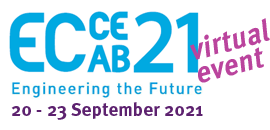

Dear Colleagues in Chemical Engineering and beyond,
every two years the European chemical engineering community comes together at the joint meeting European Congress of Chemical Engineering and European Congress of Applied Biotechnology. This year more than 3000 participants were expected at ECCE13/ECAB6 in Berlin. Since the pandemic situation in September remains unpredictable, ECCE13/ECAB6 had to move into the virtual space, a place we all have come to see quite often over the last 12 months. Virtual conferences have benefits and drawbacks compared to in-person events. Fortunately, conference systems have improved since the beginning of the pandemic and in ECCE/ECAB 2021 you will have the chance to switch between session, chat with chance encounters and talk spontaneously to other participants almost as if you were in Berlin together … only, you will have to bring your own coffee.
The motivation for virtual scientific conferences differs from in-person events. So, we can expect many more students to register as the conference fee for students is very low and travelling expenses to do not occur. This is a very cost effective way of getting experience and exposure for their work. This is a great advantage for our community, and I look forward to many young scientists participating in the event and particularly to the Science Slam which will be part of the conference. Another event which will be very interesting to all of us is the ChemCar competition which the young engineers from the kjVI organization will run.
The scientific program of ECCE/ECAB 2021 will be just as ambitious as it would have been in Berlin. Besides regular sessions ranging from the fundamentals of thermodynamics, through engineering processes, products and life, finding new routes and controlling complexity, all the way to novel approaches in education and training, we will have nine satellite sessions organized by working groups of the EFCE or research consortia which look in depth into very specific areas of chemical engineering like electro-biochemical processes, solutions for the power generation, storage and energy supply of the future or artificial intelligence in process modelling, design and operation.
I am very happy that many colleagues have decided to work together to make the 2021 joint European Congress of Chemical Engineering and European Congress of Applied Biotechnology a success in “Engineering the Future”.
I look forward to meeting all of you in September
Hermann
(Dr. Hermann J. Feise, President European Federation of Chemical Engineering)